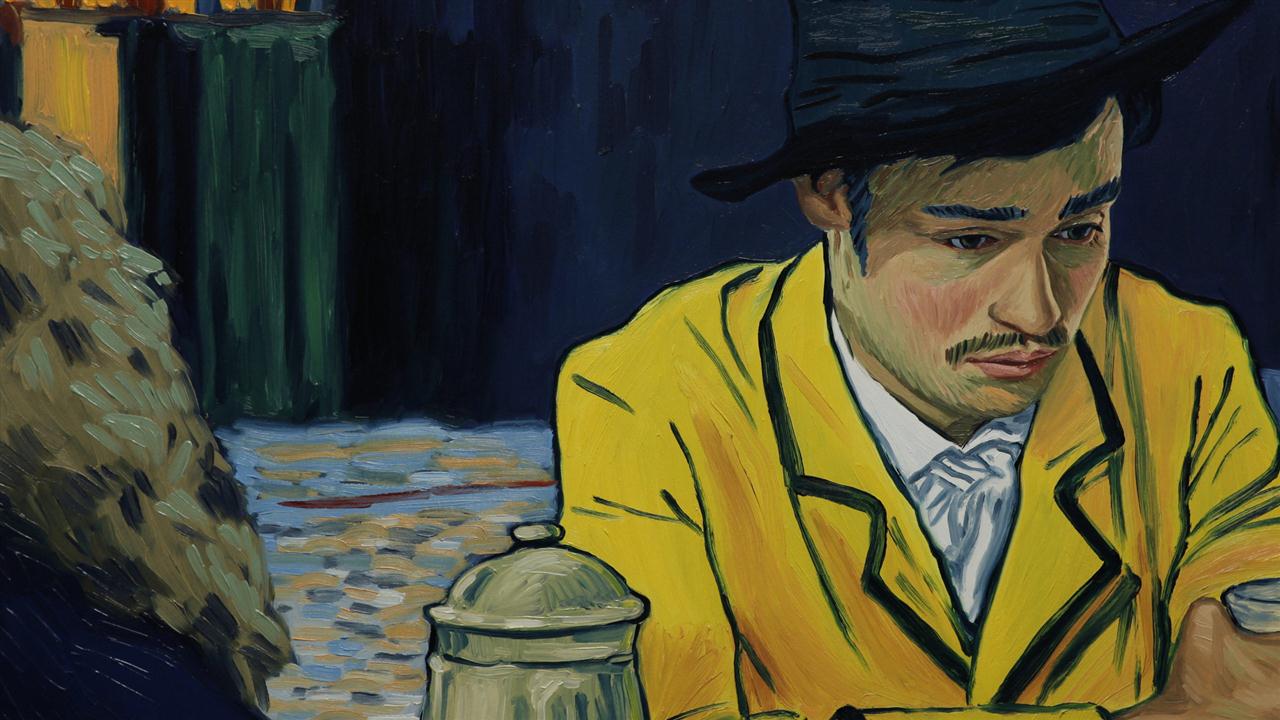
LOVING VINCENT
GDE/Breakthru Films
Reviewed by: Harvey Karten, Shockya
Grade: B+
Director: Dorota Kobiela, Hugh Welchman
Written by: Jacek Dehnel, Dorota Kobiela, Hugh Welchman
Cast: Douglas Booth, Jerome Flynn, Chris O’Dowd, Saoirse Ronan, Eleanor Tomlinson, Aidan Turner, John Sessions, Helen McCory
Screened at: Critics’ link, NYC, 9/19/17
Opens: September 22, 2017w
Stand next to a group of people looking at paintings in a major museum like the Louvre, the Prado or the Metropolitan, and you are likely to hear people showing off their ability to analyze the work of one artist. Only the real aficionados, the people who look forward vto isiting museums in their home cities and not just in Europe when they’re on vacation, and you will hear their interpretations meshing with the knowledge of the artists’ actual lives. Make a movie about an artist, a dramatic film rather than a documentary, and you’re likely to see that the writer and director embrace a theme to make the subject of narrative interest. In the case of music, Milos Forman’s “Amadeus” is not simply events in the Mozart’s life, but the fascinating idea that he was poisoned by his chief rival, Salieri. Though that is not likely given what we have learned since, Forman winks at us in the audience, showing that yes, indeed, the man was murdered.
Similarly, Dorota Kobiela and Hugh Welchman, using their script in collaboration with co-writer Jacek Dehnel, show us events in the life of Vincent Van Gogh, but with the special theme: that Van Gogh died by a shot in his stomach not as a result of suicide but of murder. Though “Loving Vincent” does not quite resolve the question which is posed to catch the viewer’s curiosity, its principal value is that the action on screen with actors serving as voices is done in Van Gogh’s impressionist style, and what’s more it involved seven years’ work copying the pictures that tell the story: 65,000 paintings in all. Amazing!
During the 94 minutes of the movie’s running time, you are staring at not one of more of his paintings, but at thousands of frames, making this the world’s first fully painted feature film. That alone makes your attendance at the film compelling. The story begins one year after the death of the artist by that gunshot wound, under which he suffered for two days without sufficient medical attention. It looks like an open-and-shut case with the artist insisted that the police and neighbors should accuse nobody, that he wished the suicide on himself. But: was he covering up? Was it an accident? And why should a man, though having cut off his ear in a fit of psychosis, do himself in during a period in which he was calm?
The directors situate a pair of folks who sat for some of Van Gogh’s oils: Armand Roulin (Douglas Booth) served as the Netherlands’ Sherlock Holmes. Roulin, at home in Arles, journeyed to Auvers-sur-Oise, the scene of the painter’s death, to chat with anyone familiar with the painter. As the son of the village postmaster (Chris O’Dowd) he had a letter to deliver to Vincent’s brother Theo, who had died soon after the painter. Chief subject of the interviews would be Dr. Gachet (Jerome Flynn), difficult to find, thereby allowing for interviews with other subjects including Pere Tanguy (John Sessions) who supplied paint, and a young woman Marguerite (Saorse Ronan) the doctor’s daughter. For flashbacks to Van Gogh (Robert Gulaczyk) black-and-white photography is used.
In this one-of-a-kind movie, we come away with either a greater appreciation of the impressionist style of the 19th century or by contrast a flooding of images that could make us dizzy. And we get insight into the life of an artist, a biographical look that might deepen the insight you would gather. This affords an impressionistic show that may not in itself show you why the painter used the bold colors of, for example, his most famous work “The Starry Night,” but might cause you to emphasize with the man through this conversation with the people in his life.
Rated: PG-13. 94 minutes. © Harvey Karten, Member, New York Film Critics Online
Comments, readers? Agree? Disagree? Why?
Story – B
Acting – B
Technical – A
Overall – B+





